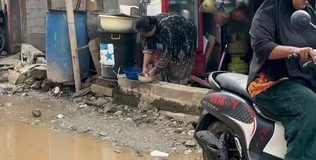
Why regulators want to ban a key ingredient in kratom drugs
Clip: 11/9/2025 | 6m 34sVideo has Closed Captions
Why regulators want to ban a key ingredient in kratom, a popular herbal supplement
Southeast Asians have used kratom leaves as a home remedy for centuries. Recently, its popularity in the U.S. has exploded as a way to ease the effects of opioid withdrawal. But kratom is poorly regulated and synthetic versions contain high levels of a powerful compound that officials say should be restricted. Ali Rogin speaks with Tampa Bay Times senior politics reporter Kirby Wilson for more.
Problems playing video? | Closed Captioning Feedback
Problems playing video? | Closed Captioning Feedback
Major corporate funding for the PBS News Hour is provided by BDO, BNSF, Consumer Cellular, American Cruise Lines, and Raymond James. Funding for the PBS NewsHour Weekend is provided by...

Why regulators want to ban a key ingredient in kratom drugs
Clip: 11/9/2025 | 6m 34sVideo has Closed Captions
Southeast Asians have used kratom leaves as a home remedy for centuries. Recently, its popularity in the U.S. has exploded as a way to ease the effects of opioid withdrawal. But kratom is poorly regulated and synthetic versions contain high levels of a powerful compound that officials say should be restricted. Ali Rogin speaks with Tampa Bay Times senior politics reporter Kirby Wilson for more.
Problems playing video? | Closed Captioning Feedback
How to Watch PBS News Hour
PBS News Hour is available to stream on pbs.org and the free PBS App, available on iPhone, Apple TV, Android TV, Android smartphones, Amazon Fire TV, Amazon Fire Tablet, Roku, Samsung Smart TV, and Vizio.
Providing Support for PBS.org
Learn Moreabout PBS online sponsorshipJohn: For centuries, people in southeast Asia have used the leaves of kratom trees as a home remedy to soothe nerves and ease pain.
Recently, it's popularity has exploded in this country as a way to alleviate anxiety and the effects of opioid withdrawal.
These products are widely available at smoke shops and gas stations.
But kratom is poorly regulated and synthetic versions contain high concentrations of a powerful compound that U.S.
Officials say should be restricted.
Ali Rogan takes a look at this controversial herbal drug with Kirby Wilson, senior politics reporter at the Tampa bay times.
Ali: Thank you so much for being here.
Let's first talk about what kratom is, how it's traditionally been used in other cultures, and how it showing up here in the United States.
Kirby: Yeah, so kratom is a very interesting substance with a long history.
It's a tree that's grown in southeast Asia, primarily in Indonesia.
And it's been used there for centuries as a medicinal sort of home remedy for a variety of ailments from an analgesic pain treatment to curing indigestion.
And so it's brewed into teas there, a lot of the indigenous people in Indonesia see it as sort of a cure for what ails Ya kind of thing.
It is not legal to import into the United States but it gets here anyway and people use it here for a little different reason.
Ali: Yeah, so tell me about that.
You've reported extensively on this, specifically about how it's showing up around the Tampa area in Florida, but what have you found in the course of your reporting on it?
Kirby: It's been an interesting dovetail with the opioid crisis in America because there have been a lot of people that have been seeking treatment for that particular affliction.
They get addicted to painkillers and they want a way out, but they don't have an easy resource.
People have used it to wean off of opioid addiction, which is honestly probably a societal good that they find somewhere to turn that isn't another street drug or back to opioids.
But the problem with it is that this is in a lot of places entirely unregulated.
People are using this substance that had been used for centuries for a completely different purpose in a way that authorities are not getting their arms around or sort of understanding and the there's not really well established limits on dosing or what how much is wise to use what form of it is wise, to use and in what circumstance.
Ali: Why is it, Kirby, so difficult to regulate kratom products?
Kirby: Really for the same reason it's so difficult to regulate anything.
It's difficult to know the exact science of how things work on the body.
Still dosing limits are poorly understood in general because everybody's body is different.
So doctors have some sense of how much of a certain drug could harm or kill a person, but that is only understood after extensive clinical trials, testing and scientific evidence.
There is great promise, don't get me wrong.
I am not too contributed -- contribute to panic around kratom.
Some people are using it safely and it is benefiting them, but they are using it in an off-label way.
And when you're using anything in an off-label way, dangers are present.
And especially when there is an industry that is incentivized to create the most concentrated possible iteration of this substance that people are using as a medicine, that's when you run into trouble.
Ali: So let's talk about those iterations.
Let's talk the difference between kratom the plants and the compounds in it which appear in different levels of concentration in some commercial products and then there's another factor of this which is the synthetic versions of those compounds which I know is kind of in its own category right now.
Walk us through all that.
Kirby: Yeah, so the thing that's been in the news most recently is a product called 7-hydroxymetraginine, or mitraginene, you might hear it pronounced, which is an alkaloid of the kratom plant.
Basically, it's a chemical that's found in the natural kratom plant at very low doses.
Scientists who have studied this chemical are worried about its potential for abuse and addiction.
It mimics opioids in the way that it interacts with our brains and may contribute to respiratory depression which is ultimately what kills people when they overdose on opioids so the trump administration and some even some states like Florida have said, no more 7-oh, which is the street name for it, we are taking it off the streets entirely.
Set that aside because there is a whole other legion of kratom products that are not 7-oh that are sort of akin to what you'd find in a traditional kratom tea.
If you go to a kava shop, you can get a kratom tea and it's more or less similar to the product that people have been drinking for centuries in Indonesia.
Then set that aside, and there are these other kratom products that are not 7-oh, but have highly concentrated forms of mitragynine, that is the operative ingredient in kratom and the effects of that are sort of unknown when it comes to these high concentrated products, but they exist and they're basically ubiquitous anywhere.
Anyone can buy them online in almost any state.
Ali: And the federal government and some of these state governments have made a distinction between the kratom product itself and the synthetic derivations of it.
Is that the way to deal with this?
Kirby: Yes, I think it is wise to break off and regulate the two as dissimilar products because even the kratom industry, which I have reported on aggressively and critically, says 7-oh should not be offered as a product.
If you are concentrating that and putting that into a product, almost everyone who's reasonable in the kratom space things there is a major problem with that.
As far as the other kratom regulations go reasonable minds , can disagree about how best to do that, and the urgency is certainly there because people again are using a product that is not a drug, like a drug.
And so there are always dangers that are going to be inherent with that.
But the uptake of kratom is so widespread throughout the country that there would be a lot more harm than we have found if it were as dangerous as opioids.
Ali: Kirby Wilson, with the Tampa bay times.
Thank you so much.
Kirby: Thank you!
♪
How the loss of USAID affects Indonesia’s climate fight
Video has Closed Captions
Clip: 11/9/2025 | 3m 57s | How the loss of USAID funding affects Indonesia’s ability to fight climate change (3m 57s)
News Wrap: Senate works over weekend as shutdown continues
Video has Closed Captions
Clip: 11/9/2025 | 2m 28s | News Wrap: Senate works through weekend as shutdown enters 40th day (2m 28s)
Study suggests risk of pediatric cancer from medical imaging
Video has Closed Captions
Clip: 11/9/2025 | 5m | New study suggests link between medical imaging and pediatric cancer risk (5m)
UNICEF: Children face ‘horrific violence’ in Sudan crisis
Video has Closed Captions
Clip: 11/9/2025 | 5m 33s | Children exposed to ‘horrific violence’ in Sudan’s civil war, UNICEF says (5m 33s)
Providing Support for PBS.org
Learn Moreabout PBS online sponsorship
- News and Public Affairs

FRONTLINE is investigative journalism that questions, explains and changes our world.

- News and Public Affairs

Amanpour and Company features conversations with leaders and decision makers.












Support for PBS provided by:
Major corporate funding for the PBS News Hour is provided by BDO, BNSF, Consumer Cellular, American Cruise Lines, and Raymond James. Funding for the PBS NewsHour Weekend is provided by...



